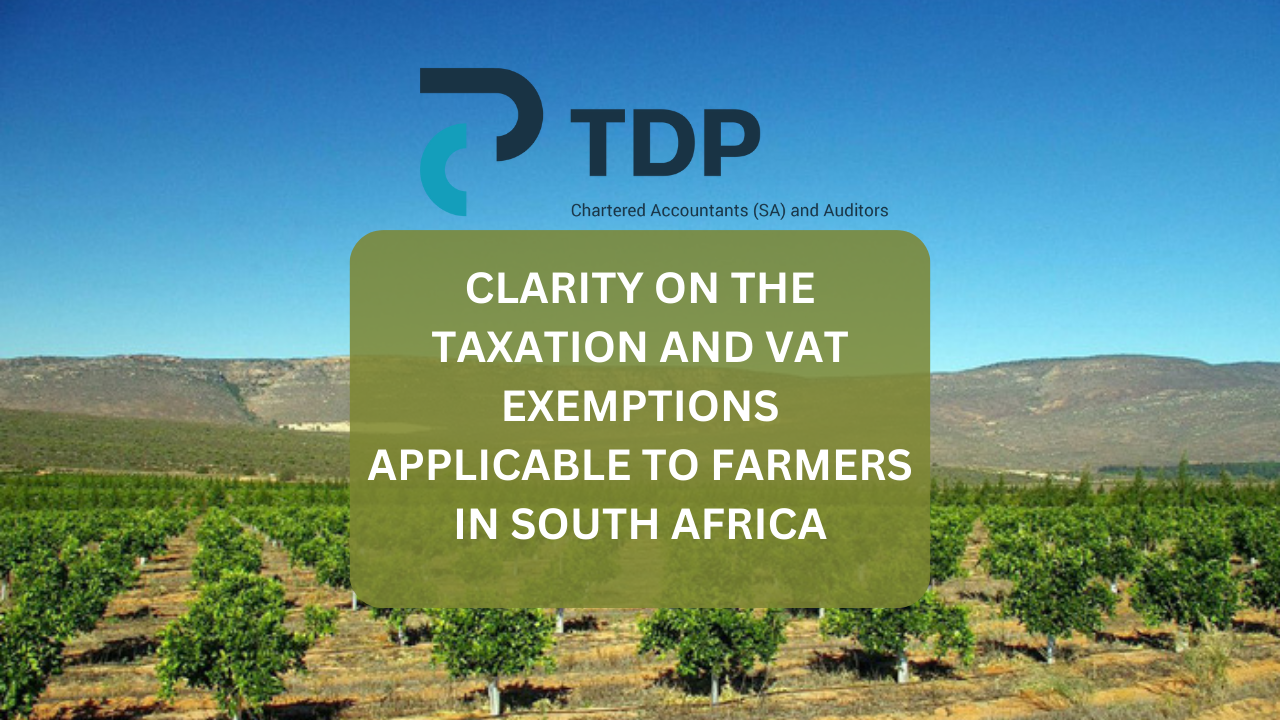CLARITY ON THE TAXATION AND VAT EXEMPTIONS APPLICABLE TO FARMERS IN SOUTH AFRICA
Agriculture and farming constitute the backbone of any economy. It is unsurprising that the Income Tax Act 58 of 1962 (the Act) outlines specific and advantageous regulations for farmers in South Africa. These unique tax rules are primarily detailed in the First Schedule of the Act.
The publication of the SARS Draft Guide on the Taxation of Farming Operations on 22nd September 2022 (the Draft Guide) would likely have been welcomed by farmers. Prior to this, the South African Revenue Service (SARS) had not provided a comprehensive explanatory document or guide for the First Schedule. This article explores key guidance notes found in the Draft Guide.
Definition of Farming Operations
For the special tax regulations in the First Schedule to be applicable, several conditions must be met. Arguably, the most crucial requirement is that the individual must be “engaged in pastoral, agricultural, or other farming operations.” This is significant because only taxable income derived from these operations falls under the special taxation regime. While ultimately, it is a matter of fact to determine if an individual is indeed engaged in pastoral, agricultural, or other farming operations, SARS’ Draft Guide suggests that “other farming activities” typically encompass undertakings like horse breeding, fish farming, and beekeeping.
- The Draft Guide elaborates on various legal cases related to the definition of “engaged in pastoral, agricultural, or other farming operations.” For instance, it mentions a case where a grower who intended solely to sell surplus crops was not deemed to be engaged in farming operations. Thus, the Draft Guide confirms that one must conduct a trade in farming with an overall profit-making intention.
- Another important issue considered in the Draft Guide is the scenario involving two parties: one owning the land where farming operations occur, and another conducting these operations. Ultimately, it depends on the facts to determine which party qualifies as “farming” and benefits from the special taxation regime. If a person leases land from another entity where they physically conduct farming operations, the one physically conducting the operations is generally regarded as the farmer. According to the SARS Draft Guide, the landowner isn’t involved in farming operations because their income arises from land ownership rather than farming operations. Interestingly, the Draft Guide suggests that if rental payments were based on a percentage of the proceeds from vineyard activities, the landowner might apply the First Schedule to determine taxable income derived from farming.
- It is worth noting that only income “derived from farming” falls within the special tax regime outlined in the First Schedule. This means not all income from farming automatically falls under the First Schedule; there must be a connection between the income earned and farming operations. Examples of “supplementary farming operations” provided in the Draft Guide include selling manure, firewood, letting grazing rights (if rental comes from farming proceeds), selling plantation and forest produce, prize money (e.g. for best wool or largest pumpkin), or compensation from the government for livestock destruction due to disease.
- Conversely, the Draft Guide states that activities like fruit packing for other farmers, winnings from horse racing where the farmer bred the horses, and accommodation and catering services for people spending holidays on the farm do not qualify as farming activities. In such cases, normal tax principles apply to that income.
Valuation of Opening and Closing Stock
Another important aspect discussed in the Draft Guide is the calculation of opening and closing trading stock for farmers, including livestock and produce. Notably, the Draft Guide confirms that consumable stores for farmers (e.g., fuel and spares used for farming equipment) and non-livestock or non-produce items do not need to be considered as closing stock for First Schedule purposes.
The Draft Guide also talks about using standard values for livestock, except game livestock, established by regulations. Farmers can choose a different value (other than the standard value), as long as it is not more than 20% higher or lower than the standard value set by regulations. If a farmer opts for a different value, they are bound by that choice and cannot alter it. The valuation of stock and produce is, therefore, a significant taxation concept for farmers.
Deduction of Capital Expenditure
In general, capital expenses cannot be deducted from income unless one of the special capital allowances in the Act applies. However, one of the most advantageous aspects of the First Schedule to the Act, pertaining to farming operations, is that paragraph 12 provides a special provision for farmers to deduct specified capital expenses.
- Paragraph 3.6.1(b) of the Draft Guide discusses some of the capital development expenses that can be claimed under paragraph 12 of the First Schedule. This includes expenses related to eradicating noxious plants and alien invasive vegetation, preventing soil erosion, dipping tanks, dams, irrigation schemes, boreholes, pumping plants, fences, and erecting or improving buildings used for farming operations (excluding those for domestic purposes).
- Importantly, the Draft Guide also addresses the deduction of costs related to the construction of roads, bridges, and electrical infrastructure. However, not all infrastructure expenses will necessarily fall under paragraph 12 of the First Schedule, as it must be demonstrated that the roads and bridges are used in connection with farming operations. Electrical infrastructure costs must be predominantly (more than 50%) used for farming purposes and not also for the farmer’s domestic premises.
Zero rating and Exemption upon Importation of certain Goods
The VAT Act provides special dispensations to a vendor that carries on agricultural, pastoral or other farming activities (farming enterprise).
The first dispensation allows a vendor that carries on a farming enterprise to acquire certain goods at the zero rate or import certain goods exempt from VAT. These goods must however be used or consumed in the course of conducting a farming enterprise. The intention of this dispensation is to assist a vendor that carries on a farming enterprise with their cash flows.
Some of the goods that may be acquired under this dispensation are –
- Animal feed;
- Animal remedy;
- Fertilizer;
- Pesticide; and
- Plants and seeds used for cultivation.
Tax periods
The second dispensation allows a vendor that carries on a farming enterprise to register under the Category D (6 monthly) tax period. This is to assist the vendor with cash flows due to the cyclic nature of farming.
A vendor that intends to be placed under the Category D tax period must meet the following criteria:
- The enterprise must consist solely of agricultural, pastoral or farming activities; and
- The total turnover from all farming activities must not exceed R1,5 million per consecutive period of 12 months.
Where the value of taxable supplies exceeds R1,5 million in any consecutive period of 12 months, the Commissioner will allocate either a Category A or B tax period to the vendor (2 monthly tax period).
Where the value of taxable supplies exceeds or is likely to exceed R30 million in any consecutive period of 12 months, the vendor will be obliged to fall within the Category C tax period (monthly tax period).


